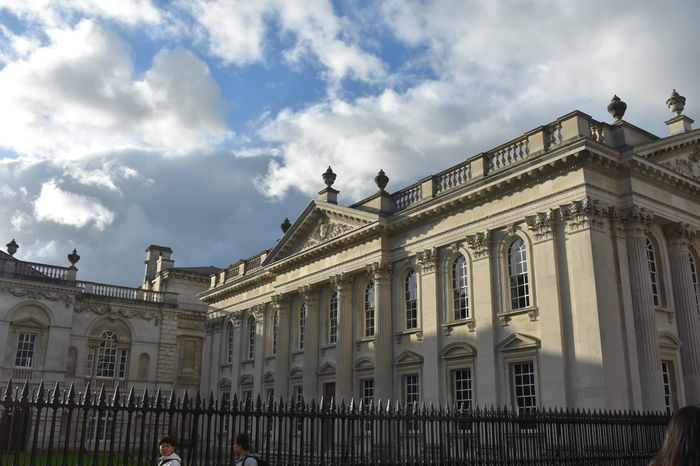Gender pay gap 22% wider for central University academics than in colleges
The School of Humanities and Social Sciences recorded the highest gender pay gap (11.66%) among the central University’s six academic schools

The gender pay gap among Cambridge academics is 22.63% wider in the central University than in its colleges, according to Freedom of Information requests.
As of October 2024, female academics in 19 responding colleges earn, on mean annual average, 10.32% more than their male counterparts, with 15 colleges reporting higher pay for women.
In contrast, the central University has a gender pay gap unfavourable for female academics. Female academics earn an average salary of £69,798.76, compared to £79,593.24 for men – a 12.31% disparity. This reflects a 22.63% overall pay gap divide between central University departments and the colleges.
Among the central University’s six academic schools, the School of Humanities and Social Sciences recorded the highest gender pay gap (unfavourable to women) at 11.66%, followed by the School of Technology at 10.35% and the School of Physical Sciences at 7.66%. Meanwhile, the School of Biological Sciences had the smallest gap at 5.18%.
Most colleges recorded pay gaps with female academics earning more than men. Gonville and Caius had the largest at 39.5%, followed by Magdalene (34.26%), Queens (24.58%), and Emmanuel (24.40%). Four colleges reported pay gaps favouring men: Darwin (14.01%), Girton (5.30%), Clare (3.67%), and Pembroke (0.35%).
Colleges used different criteria for defining and reporting academic roles, unlike the central University’s more fixed positions. Some included research fellows, tutors, and deans, while others distinguished between full-time and part-time roles.
Reporting also varied regarding college assistant professors and directors of studies. Some colleges excluded directors of studies, as they are usually paid per student rather than receiving a fixed salary, unless they also hold assistant professor roles.
Where 12 colleges declined to provide data, they cited either a lack of records or too few collegiately employed academics to report meaningful statistics.
A spokesperson for the University College Union (UCU) said: “The UCU has campaigned for many years to eradicate the gender pay gap, along with other forms of unequal pay. Institutional sexism is deeply embedded in Cambridge, not only in basic pay but in other areas such as so-called market-pay supplements (where men were granted 73.5 percent of the total value of these awards in 2022-3).”
“Women are more likely to be in lower-paid roles, difficulties in accessing affordable childcare disproportionately affects them, which often impacts promotion chances and feeds in pension gaps. The University needs to do much more to address these problems,” they continued.
Nowsha Farha, the Students’ Union’s Women’s Officer, told Varsity that she is “committed and dedicated to advocating for transparency and meaningful action to address the stark contrast between the pay structures across Colleges, Department and Central University Systems. This has been a subject of discussion at the General Board Meeting.”
According to the university’s annual Equality Diversity and Inclusivity (EDI) reports, the gender pay gap in the central academic university has narrowed by 7.29% since 2017.
In 2023, the University drew up a global Gender Pay Gap Action Plan which committed to measures such as “diversifying recruitment, promoting flexible working options, levelling roles and advertising them with pay ranges to increase transparency, and expanding our gender pay gap reporting in the locations where we have the numbers of employees to make such reporting meaningful.”
Despite this, a November report from the Higher Education Policy Institute found that women are less likely than men to achieve first-class degrees at Oxbridge than at other universities due to “combative and confrontational” teaching styles, examination-based assessments, and a lack of female representation.
According to the report, at Cambridge, theology had the largest first-class degree attainment gap on average at Cambridge over the last decade, with a 20.6 percentage difference, followed by Mathematics (20.1%) and Archaeology (15.7%).
That same month, Varsity reported that white Cambridge academics are paid almost 6% more than BME colleagues as of October 2024, marking the third consecutive year that the ethnic pay gap across all staff had increased.
A Cambridge spokesperson stated: “The University is committed to tackling gender disparity and advancing Equality Diversity and Inclusion. A detailed analysis of the University’s gender pay gap is being conducted to identify key causes and interventions required to close it.
“The main contributing factor within the University is that the distribution of people in different positions is not balanced, rather than people in the same positions being paid differently. This core issue is something we are working to address,” they added.
Want to share your thoughts on this article? Send us a letter to letters@varsity.co.uk or by using this form.
 News / Clare Hall spent over £500k opposing busway 24 December 2025
News / Clare Hall spent over £500k opposing busway 24 December 2025 Comment / The ‘class’ of Cambridge24 December 2025
Comment / The ‘class’ of Cambridge24 December 2025 News / Caius mourns its tree-mendous loss23 December 2025
News / Caius mourns its tree-mendous loss23 December 2025 News / Girton JCR publishes open letter expressing solidarity with Palestine25 December 2025
News / Girton JCR publishes open letter expressing solidarity with Palestine25 December 2025 Comment / Yes, I’m brown – but I have more important things to say22 December 2025
Comment / Yes, I’m brown – but I have more important things to say22 December 2025










